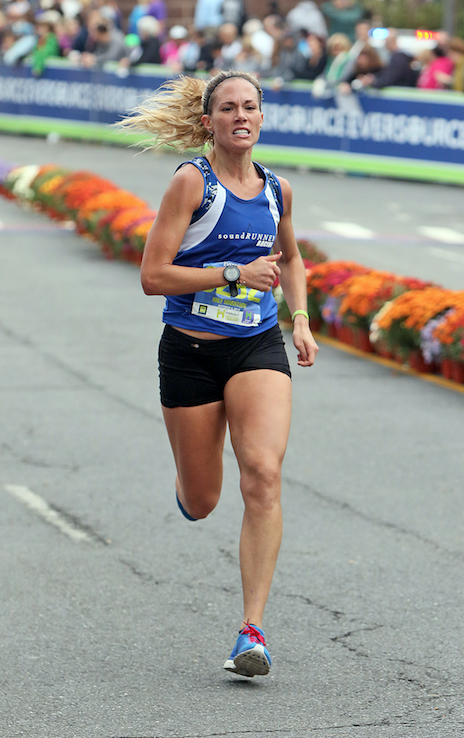L9P Community Post: Mary Johnson
The pressure was constant. It started in kindergarten:
You’re not mature enough to do reading class with the first graders.
Then 2nd grade:
You’ll be a camel in the nativity play because you’re not small enough to be an angel.
5th grade:
You’re not cool enough to play with us.
And 7th grade:
I didn’t think they made clothes big enough to fit you.
8th grade:
You’re too fat and not pretty enough to go out with Matt.
Every time I was told I wasn’t enough, it stung like a thousand bees. So by the time I was a junior in high school, I constantly felt like I wasn’t athletic/cool/pretty/smart enough to…be myself. I began to control the only thing I thought I could: my food.
At the age of 16, the dieting and restricting began.
I lost a great amount of weight very quickly. My BMI never dropped low enough to diagnose me with anorexia, so even though I could have been diagnosed with EDNOS (Eating Disorder Not Otherwise Specified), I was inherently too embarrassed to ask for help. I thought eating disorder recovery programs were meant for thinner people, with lower BMIs — people who were more successful at their ED than me.
After a few months of restricting food, my weight was at an all-time low. My clothes were falling off, I was constantly cold, and my feet and hands would go numb on a frequent basis. Teachers began to talk, classmates began to stare, and I eventually spent my lunchtimes alone in bathroom stalls because I didn’t want to experience the stress and anxiety of being around food. I lied to those who asked if I was ok:
I knew I wasn’t okay, but I didn’t think I was good enough to deserve help.
Then, my eating disorder went in the opposite direction and I began to binge and purge. The binging and purging cycle continued for 6 years, with some months being worse than others.
My period was absent for most of college and my weight fluctuated.
As a Division 1 athlete on the crew team, I quantified my missing period with being fit. I would get disappointed when it came, thinking it meant I wasn’t at my peak fitness. I went through one variety box of tampons in my entire collegiate career…and I was proud of that.
I would get disappointed when my period came, thinking it meant I wasn’t at my peak fitness.
As a senior, I was sicker than ever, sometimes purging several times a day in combination with training at least once a day. When I arrived to my house senior year, one of my roommates muttered under her breath how I needed to eat a hamburger, because she could see every ab muscle in my stomach. I pretended not to hear her, but was secretly glad she noticed my 6-pack. Before the rowing season began, I did briefly seek help at an outpatient treatment facility; but it was far from campus and recovery wasn’t really a priority.

At my lowest weight in college, performance starting to suffer.
Instead of prioritizing my health, I prioritized my performance on the crew team. I had a breakthrough fall semester, PR-ing in every erg test from the 60-minute “hour of power” to the 2k. I was the leanest I had ever been in my life, and my excessive training paid off for a while.
But then, of course, my athletic success came to a screeching halt in the second semester. I kept getting sick — to the point where I went to the hospital three different times because my fevers were out of control from a weakened immune system—due to exhaustion and malnutrition. My PRs didn’t budge, and I ended my collegiate rowing career with a rejection from the sub-elite rowing team I had dreamt of joining for the past 9 months.
I wasn’t good enough.
I entered into the rabbit hole of corporate America.
After graduation, I started quantifying my self worth with the number of hours I spent in the office. The bingeing and purging cycles stopped, but my eating and relationship with food was still disordered. I gained a lot of weight and my period returned — a sign to my sick self that I was not in shape, and therefore, not worthy. I had constant heartburn from the years spent bingeing and purging, and I went on prescription heartburn medication at age 22 because my chest and stomach constantly burned. I remember getting embarrassed at the dentist’s office when he noticed enamel erosion on half of my bottom teeth.
Join our Lane 9 Project community and newsletter. Share your story.
Then I found running
I formed a relationship with running that was completely unlike the unhealthy relationship I had with rowing. When I ran, I felt strong. I felt invincible. I felt like I was flying. My heartburn disappeared, and for the first time in my life, I began to eat like an athlete because I realized that food is fuel. I loved that results came from hard work: achieving running goals gave me a sense of accomplishment that was so much more empowering and meaningful than any disordered sense of pride felt from restricting or purging.
Running was the catalyst for change I needed to make with myself and my body.

Strong, healthy, and confident
Over the course of 5 years, I began to see how strong, powerful, and resilient I am. I realized that self worth didn’t come from how my body looked, or what a number on the scale told me.
I began to love myself and I realized that I was enough — no matter how much I weighed.
Unfortunately, my running career has been riddled with numerous stress fractures, so when I asked my doctor for a bone scan, she gladly put in the order. Before arriving to the hospital for the scan, I filled out a detailed survey about my health history. For the question asking about my history with menstruation cycles, I wrote that my periods were irregular for 6 years.
I arrived to my bone density test nervous, but ready to get it over with. As the woman administering my test went through my survey, it was clear that she was struggling to understand why I was there in the first place. Here I was: a healthy, fit, 30-year old woman. What business did I have getting a bone scan?
“Well I’ve had a lot of stress fractures,” I interjected impatiently.
“Oh. I see. And period loss for…6 years?” She asked, peering over her glasses, judging every inch of my toned, lean, tanned, healthy body.
“Yes. I had some eating problems and was an athlete in high school in college. My period was extremely irregular for 6 years…but I’ve been very regular for a few years now.” I was proud that I could say out loud to a health professional that I had a regular period.
“Interesting. And what was your weight when it was irregular like this?”
“There was a range…” I went on to explain that it first went away in high school and continued to be irregular in college, particularly when I was training heavily.
She turned in her chair to glance at my survey, paused, then whipped back around and said, “Wow, huh, really?? That’s all you weighed when your period went away? That doesn’t seem thin enough.” Then she turned back to the survey.
I wasn’t thin enough. I wasn’t good enough.
There it was again. I was being told that I wasn’t enough by someone who knew nothing about me, my situation, or my body. I finished the test and walked out of the hospital shaking my head, furious at the way I had just been spoken to. And as I started my car and made my way back home, the experience made me realize just how far I’ve come.
The old me would’ve used her statement to enter into a binging frenzy, ending in a numb stupor on the floor with a throbbing throat and a sore knuckle.
But I’m not that girl anymore, and I haven’t been that girl for a few years now. Now I am free and more aware of myself than ever before. I love myself for who I am and what for I’ve accomplished. My self worth is no longer quantified by my weight; but rather from who I’ve become after years of confusion and sickness.
Because now I can see that I was always beautiful.
I was always smart.
I was always unique.
I was always cool.
I was always strong.
I was always inquisitive.
Today, I can sing from the rooftops that I am enough, and I always have been.
